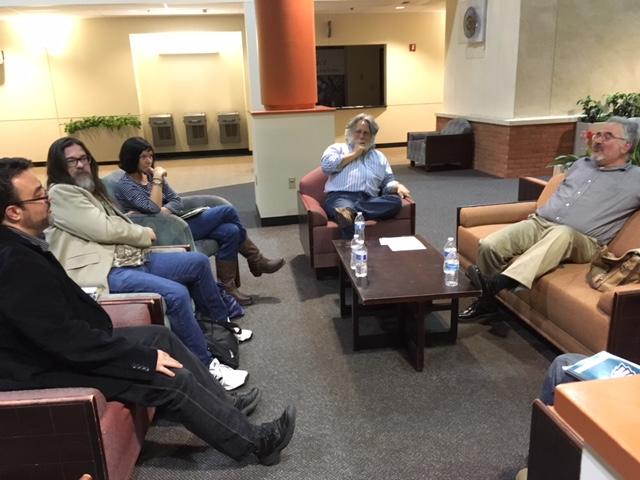An academic symposium hosted by Bucks’ Dean of Social and Behavioral Sciences recently took place at the Newtown campus, with topics ranging from propaganda to tuition-free college and the rise of Donald Trump.
The event titled “Propaganda, Social Philosophy, and Democracy,” tied together various presentations on political and media topics, with professors from Temple University as well as Buffalo State University presenting their findings alongside Bucks professors.
As the various academics gave their presentations, one issue was on their minds more than any other, the 2016 elections.
“The symposium may give us a chance to explore a more thoughtful level of political discourse than what we are seeing today,” said Mark Cobb, Philosophy professor at Bucks.
Cobb gave a lecture on the implications of what is being said during this election season, and more importantly, what isn’t being discussed.
“Today, we are political spectators, rather than participants,” he remarked. “In July 2015, Jimmy Carter spoke in Atlanta and he said, ‘America no longer has a functioning democracy.’ The press failed to report it.”
Cobb described a long tradition of anti-democratic thought, ranging from the Sophists of ancient Greece to 20th century American writer Edward Bernays, who is often described as “the founder of public relations”.
The Sophists, Cobb explained, were “philosophers of the ruling class.” They believed that to maintain power, they would “use force in one place, and illusion in the other.”
“In other words, they would have both a public and a private position,” Cobb said, in a veiled reference to Hillary Clinton’s controversial remarks during the 2016 election. In a paid speech revealed by Wikileaks, the candidate said that she needed to have “both a public and a private position.”
Similarly, Barneys said that propaganda “is an essential tool for the elites.” His book, Propaganda, published in 1928, had a huge impact on the advertising and marketing industry that continues to this day.
Cobb said that one step we could take to see through propaganda is to “make Bucks and other public colleges free.” This is because “free time and education are essential in a democracy.”
Another speaker, John Abromeit, from Buffalo State University, spoke about the rise of Donald Trump and other right-wing populists from an academic angle, looking through the lens of Frankfurt School thinkers Max Horkheimer and Theodore Adorno.
Horkheimer and Adorno believed that an American populist would “fall back on all the clichés of Americanism, such as the flag,” as well as rely on anti-intellectualism, anti-government rhetoric, and identification with the police.
Today, Abromeit explains, “Trump and the Tea Party represent the latest incarnation of right-wing populism in America.”
The Frankfurt School predicted that a populist would split America into two groups: “producers” and “parasites.”
Abromeit says that in Trump’s worldview, the former category includes people from workers to executives, with the latter group including big bankers and “corrupt” career politicians.
David Brahinsky, professor of Philosophy and Religion at Bucks, also discussed the billionaire in his speech, using the findings of psychoanalyst Wilhelm Reich to explain the suppressed desires that, in Brahinsky’s eyes, led to Trump’s rise.
Ironically, the Republican Presidential nominee was in Newtown during the day of the symposium, limiting peoples’ chance to attend the discussions.
“I hear Donald Trump’s in town today, but I’ve always been interested in quality over quantity,” Cobb joked.
The event was not very well-publicized, either. Information was sparse and the symposium didn’t appear in the Bucks Live catalog, a pamphlet which did on the other hand include a movie viewing.
“I thought that hundreds of people might turn up. It’s a shame,” said James Freeman, a Bucks professor who attended the event.
One possible idea to assure greater turnout is for the Honors department to promote future symposiums more effectively.


